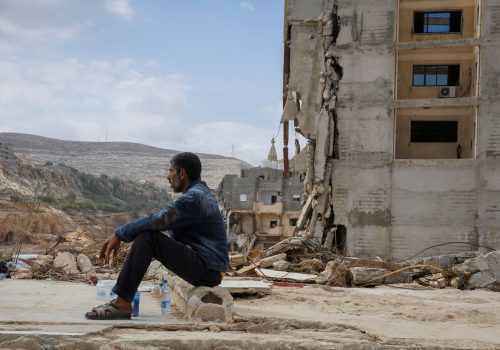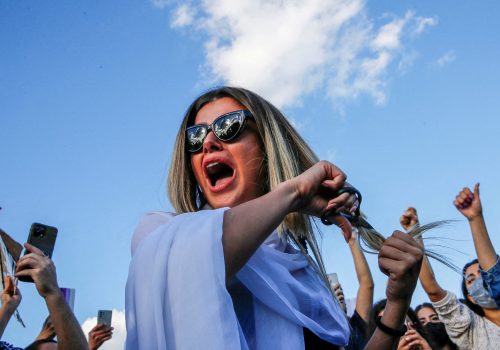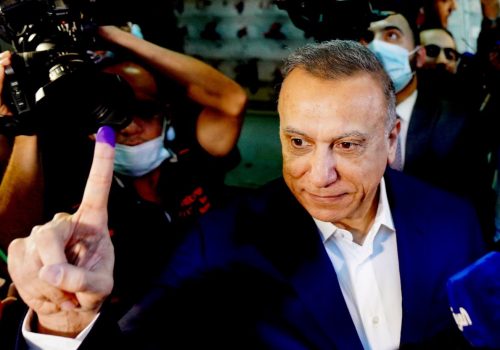Need a book on the Middle East to read during the holidays? Here’s our recommendations
It’s that time of year, when all you want to do is cozy up by the fireplace or lounge by the beach and read. Our team of experts and staff have you covered with their recommended reads related to the Middle East and North Africa for the holidays. We promise you won’t be disappointed.
‘Vision or Mirage: Saudi Arabia at the Crossroads’ by David Rundell
Saudi Arabia is a mid-sized country with outsized influence due to the unique global role it has played in energy markets, within the Islamic community, and as a security partner to the United States. If you want to understand its history, its relationship with the United States, and its domestic ambitions and challenges, then you should pick up Vision or Mirage by David Rundell, who is an American diplomat who spent thirty years in the country.
This book helps frame the most important question about the country today: is the bigger risk that Saudi Arabia is not reforming fast enough or that it is reforming too fast? The former is what I often hear from critics in Washington, but the latter is what people elsewhere in the region are worried about.
—William F. Wechsler is the senior director of the Rafik Hariri Center and Middle East Programs at the Atlantic Council.
‘Black Wave: Saudi Arabia, Iran, and the Forty-Year Rivalry That Unraveled Culture, Religion, and Collective Memory in the Middle East’ by Kim Ghattas
Black Wave offers an excellent and well-researched account of the intricate developments of the Middle East in the wake of the 1979 Iranian revolution. It reflects not only historical facts and data but also inside stories and firsthand accounts that have not been presented before. The book delves into many of the root causes of the current geopolitical trends that affect not only the Middle East but the world. For instance, it covers the relationship and competition between Iran and Saudi Arabia, the rise of interstate or cross-border groups undermining state authorities, and sectarian conflicts. It’s very insightful.
—Nadereh Chamlou is a nonresident senior fellow at the Atlantic Council’s empowerME initiative and an international development advisor.
Russian-Arab Worlds: A Documentary History by Eileen Kane, Masha Kirasirova, and Margaret Litvin
One of the best books published in 2023 on Russia’s relations with the Middle East is one that policy-oriented audiences are likely to miss but really shouldn’t: Russian-Arab Worlds: A Documentary History. Edited by two history professors (Eileen Kane and Masha Kirasirova) and one Arabic/comparative literature professor (Margaret Litvin), the book is a compilation of thirty-four documents written between 1773 and 2019 by Russians and Middle Easterners (with expert introductions to each) on various aspects of their multifaceted relationship with each other.
Several of these documents show that the Middle East has not been a passive arena in which Russian governments have acted. Instead, various Middle Easterners have actively sought to interact with Russia. Other documents describe how the Imperial Orthodox Palestine Society, in particular, fostered Russian popular interest in Palestine and an affinity for Russia in the Levant.
Above all, this collection of documents provides a sense of the deep roots of Russian soft power in the Middle East. This is something Western foreign policymakers need to understand.
—Dr. Mark N. Katz is a nonresident senior fellow with the Atlantic Council’s Middle East Programs.
‘Prisoners of Geography: Ten Maps That Tell You Everything You Need to Know About Global Politics’ by Tim Marshall
Prisoners of Geography has been a staple on my bookshelf since 2015, when it was originally published, but I took the opportunity to review it after October 7.
The chapter on the Middle East explores how geography has shaped its history, politics, and conflicts. The region is divided by mountains, deserts, rivers, and seas, creating natural barriers and borders that have influenced the identities and alliances of its people. Its oil wealth, water scarcity, and religious diversity have further contributed to its instability and violence. The chapter covers topics such as the Arab-Israeli conflict, the rise and fall of the Islamic State of Iraq and al-Sham (ISIS), the rivalry between Iran and Saudi Arabia, the Kurdish situation, and the challenges of Iraq, Syria, and Lebanon.
While time has passed since its initial publication, the themes stand the test of time. The Middle East is a complex and dynamic region often misunderstood and misrepresented by outsiders. However, the region’s geography is not destiny but rather a factor that must be considered when trying to understand and resolve its problems. If you are interested in the transformation of the Middle East, dig into the other two books in the Tim Marshall trilogy: The Power of Geography: Ten Maps That Reveal the Future of Our World and The Future of Geography: How the Competition in Space Will Change Our World.
—Marcy Grossman is a nonresident senior fellow with the Atlantic Council’s Rafik Hariri Center and Middle East Programs and former Canadian ambassador to the United Arab Emirates.
‘Syria’s Secret Library: Reading and Redemption in a Town Under Siege’ by Mike Thomson
Many of us agree that libraries possess a kind of charm that can captivate a visitor upon stepping in—whether it’s the smell of rustic shelves, the orderly display of books, or the soothing sound of silence embodying the space. If you can relate to this experience, then Syria’s Secret Library is for you.
In the government-besieged town of Daraya, a group of Syrian civilians find a glimmer of hope amid the horrors of death and destruction brought by the civil war in a small underground library that they secretly built from scratch. In a series of exchanged letters and phone calls with these librarians, BBC journalist Mike Thomson documents the journey of this library and that of its guardians, who find refuge through literature and purpose to be enlightened in the darkest of times.
—Nour Dabboussi is the program assistant to the Atlantic Council’s Rafik Hariri Center and Middle East Programs.
‘Moroccan Other–Archives: History and Citizenship after State Violence’ by Brahim El Guabli
Moroccan Other-Archives investigates how histories of exclusion and silencing are written and rewritten in a postcolonial context that lacks organized and accessible archives. The book draws on cultural production concerning the “years of lead”―a period of authoritarianism and political violence between Morocco’s independence in 1956 and the death of King Hassan II in 1999―to examine the transformative roles memory and trauma play in reconstructing stories of three historically marginalized groups in Moroccan history: the Berbers/Imazighen, the Jews, and political prisoners.
—Sarah Zaaimi is the deputy director for communications at the Atlantic Council’s Rafik Hariri Center & Middle East programs.
‘The Vanished Imam: Musa al Sadr and the Shia of Lebanon’ by Fouad Ajami
Written by the late scholar Fouad Ajami, The Vanished Imam offers a personal account of the charismatic religious and political leader Sayyid Musa al Sadr. The book details his life from the mid-twentieth century to his mysterious disappearance in the summer of 1978. Exploring the history of southern Lebanon, where a sizeable Lebanese Shia population resides, Ajami eloquently intertwines the narrative of the imam’s tireless efforts for reform and the countless struggles he faced; it is a tale of his commitment to his community and adopted country—all set against the backdrop of increasingly challenging circumstances.
For those watching the developments currently playing out across southern Lebanon, this is a highly recommended read, as it provides a valuable glimpse into the origins of the Amal Movement and Hezbollah.
—Masoud Mostajabi is a deputy director of the Middle East Programs at the Atlantic Council.
Further reading
Mon, Dec 18, 2023
2023: A year in the Middle East
MENASource By
2023 was a tumultuous and tragic year for the Middle East and North Africa. It also produced moments of hope and diplomatic feats.
Fri, Dec 23, 2022
2022: A year in the Middle East
MENASource By
2022 was a year full of unprecedented protests, groundbreaking state visits, historical elections, and new challenges for the Middle East and North Africa.
Fri, Dec 17, 2021
2021: A year in the Middle East
MENASource By Holly Dagres
2021 was a year full of impactful elections, historic anniversaries, and new challenges for the Middle East and North Africa.
Image: A Palestinian attends the reopening of the new Samir Mansour bookshop after it was destroyed during last year's 11-day war between Israel and Hamas, in Gaza city on February 17, 2022. (Photo by Majdi Fathi/NurPhoto)


